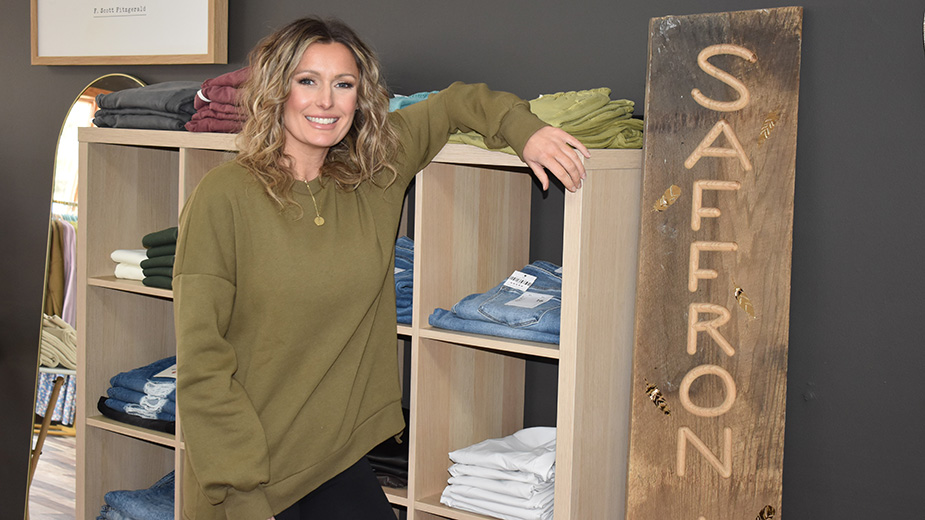YOUNGSTOWN, Ohio – Like many entrepreneurs, Cassie Hulick spent a good bit of the COVID-19 pandemic selling merchandise online.
She had launched Saffron + Sage Boutique not long before the pandemic hit. Operating out of her house in Ellwood City, Pa., she sold merchandise including women’s clothing, shoes and accessories.
“My goal is to try to just keep it affordable,” Hulick says. “You hear the word ‘boutique’ and usually they’re very overpriced.”
Last fall, Hulick, who also works as a teacher, made the leap from online retailing to opening a physical storefront, taking about 800 square feet in the Volant Depot building in Volant. “Online shopping is key for a lot of people, but some people still like that [in-person] shopping experience,” she says.
While many businesses downsized their physical spaces with the shift to remote work because of the pandemic, the growth of online entrepreneurs like Hulick is creating opportunities to fill existing spaces.
It’s a phenomenon that Russell Mills, vice president and senior regional officer at the Federal Reserve Bank of Cleveland, reflected on Feb. 28 at the Shenango Valley Chamber of Commerce economic forecast breakfast.
The number of businesses created online during the pandemic is “one of the hidden stories of COVID,” he said.
“A lot of people sold a lot of things online during the pandemic, and then they wanted a bricks-and-mortar storefront,” which he said has led to a decline in office and retail vacancy rates.
About 30% of online retailers look to establish a physical storefront as one of their priorities in the next year or so, Maggie Horne says. Horne is director of the Gannon University Small
Business Development Center in Erie, Pa.
“We still like to touch and feel and look at the items that we buy,” she says. Some shoppers remain uncomfortable paying and entering their information online and waiting for their purchases to be delivered, she says. Also, many rural areas have sketchy access to the internet. So in-person shopping for some is less a preference than a necessity.
Bob Collins “absolutely” sees the phenomenon taking place locally. Collins is a commercial real estate agent with Berkshire Hathaway Home Services the Preferred Realty. One of his colleagues helped Hulick find a site for her business.
Collins regularly shows commercial properties, including a building he represents near the Hermitage Square Plaza – which “gets looked at all the time,” he says – to entrepreneurs who tell him their houses can no longer support the businesses they launched online.
“They need a little shop and storefront,” Collins says. These entrepreneurs include a woman who designs, makes and sells kids’ clothes but now is buying so much material that her garage is full and she has no place to park the car.
That’s exactly the situation Hulick faced.
“I was outgrowing my house,” she says. She used a spare bedroom to warehouse inventory until there were “boxes overflowing everywhere with nowhere to put them.”
Initially just looking for storage space, she decided she might as well take advantage of the activities in Volant and open a storefront that could operate on weekends and during events that take place in the Lawrence County borough.
In some cases, even if the business hasn’t expanded to where operating in the house is inconvenient, some business owners don’t believe it’s a good idea to run a business there. “Your house is for getting away from all that stuff,” Collins says.
Lisa Resnick, the founder and owner of Dandelion Properties in Canfield, also has worked with entrepreneurs who launched their businesses online or used social media and subsequently “determined that there was a need for them to become bricks and mortar as well,” she says.
Among such businesses Resnick worked with is The Beauty Boutique, which Kelly Catullo and her sister-in-law, Nicci Farris, launched online during the pandemic. Within a few months, 6,000 customers registered with their boutique.
“And they determined that they needed a bricks-and-mortar location for people to go as well,” Resnick says.
Resnick worked with the entrepreneurs to find them a storefront on Market Street in Boardman. “I’m also getting a lot of startup entrepreneurs that are creating their own businesses,” she says, “which is amazing.”
During his presentation, the Cleveland Fed’s Mills said some of these entrepreneurs’ moves met with “mixed success” and noted that establishing a physical presence requires “a little bit more of a commitment” from the business owner.
“It’s a large capital commitment to open that bricks and mortar,” leading many online retailers to remain virtual only, Gannon’s Horne says.
Finding the right space can present a challenge. Berkshire Hathaway’s Collins has shown a couple of East State Street storefronts to prospective users, both of which require upgrades to their restrooms to comply with the Americans with Disabilities Act.
“Buildouts on those things are expensive,” he says.
Hulick initially reached out to a real estate agent about a house that she saw was for sale that she considered using for storage, and the agent recommended an available commercial property.
“We looked at a few different ones in the area, and this one ended up working out for me,” she says. But with inflation, “it’s hard to find something that’s reasonable.”
Still, business at the storefront is going well, she reports. Volant is largely outdoor shops, so winter was slow, but Volant has “a ton of upcoming events” that will take place throughout spring and summer.
“So during those events, it’s very busy,” she says. “But I still do a majority of my sales online, too, which is very helpful.”
Pictured at top: Cassie Hulick is the owner of Saffron + Sage Boutique in Volant.
